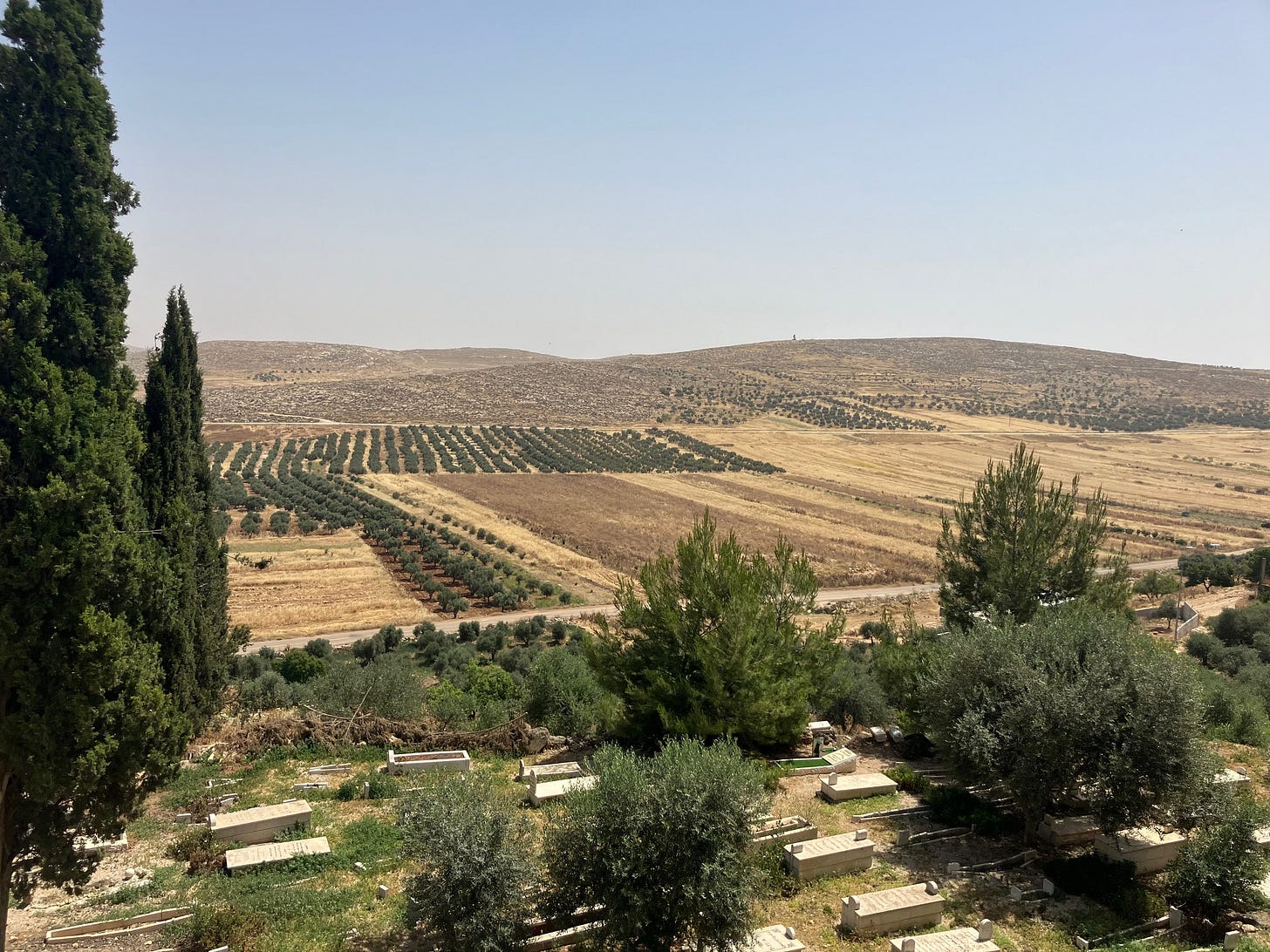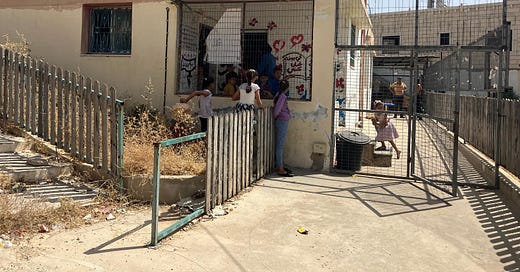24 JULY—The children of Palestine are striking for their curiosity and fearlessness. Small groups approached whenever I was out walking, often trailing me for several blocks, as they peppered me with questions: “Where are you from?” being the most common. It was generally followed by “How old are you?”
I thought the query about my age peculiar and even a bit cheeky until a teacher explained to me that it was among the standard questions they learn when studying English.
Inevitably the boldest among them would ask the one question they were most interested in knowing the answer to, especially coming from an American: “Israel or Palestine?” That was how it was always phrased. No elaboration. Everyone understood what was being asked, and I always showed them the respect of answering it: Did I support Israel or was I loyal to Palestine?
Given the language barrier, it was impossible to give these kids any kind of serious or thoughtful reply, one that could begin to encompass the historical context and magnitude of Israel’s genocidal assault on Gaza, to say nothing of my own country’s complicity—a fact these kids were, without exception, keenly aware of and about which I was challenged more than once.
What these kids most wanted to know, and indeed needed and deserved to know, was that there were people in the world—and especially Americans—standing on the side of Palestine. Their approval of my reply was generally expressed with raucous delight. That a display of solidarity from one lone American should be a cause of such apparent hope and happiness always left me feeling profoundly sad.
Above all else, the kids I met were curious about the presence of a foreigner and eager to practice what English they had learned.
■
The children I met in the farming village of al–Mughayyir late in my trip through the West Bank were different. Or so it seemed to me. Perhaps being from a small rural community, they were naturally more cautious and reticent. They were also younger than the groups of kids I met on the streets of al–Khalil. But these youngsters had good reason to be wary of the sudden appearance of strangers.
The kindergarten was our last stop in the village the day I visited. These children and this school need help. It is for this reason I write this piece: to ask you to join me in supporting a playground project this kindergarten urgently needs. It is a modest project that needs financing and will make an immense difference in the lives of the village’s children.
As we approached the tiny two-room school, a young boy began yelling. Very soon his teacher appeared. More children followed her. And then a second teacher stepped from her classroom to find out what was happening.
My translator, a woman in her late twenties deeply committed to helping her people and who, to protect her, I cannot name, leaned close to explain the sudden commotion, “He was saying ‘Soldiers! Soldiers! Soldiers!’” Israeli Occupation Forces soldiers had stormed the village three days earlier and had been just across the street from the kindergarten. The frightened boy, not recognizing the strangers approaching his school, was sounding an alarm.

Al–Mughayyir has been raided frequently since 7 October, by Israeli soldiers and illegal settlers. Cars and houses have been burned. Villagers have been shot and killed. Homes have been ransacked. Fields have been destroyed. Children have been beaten. Men and boys have been arrested without charge and taken away where they all but disappear into the brutal Israeli prison system. On one raid in April, two water tanks on top of the kindergarten were intentionally targeted and destroyed. I was shown a photo in which the bullet holes were clearly visible.
My tour of the school was quick; there wasn’t much to see beyond the two rooms and a play area with too little space and almost no toys or play equipment. My guide pointed out a modest lot next to the school, vacant and overgrown with weeds. The land is owned in common by the villagers and it is here they had planned to pool their resources and build a new playground. The project had sadly been put on hold.
Since 7 October the local economy has all but collapsed. The olive harvest, which takes place in November and December and is a main source of income for the village, didn’t happen last year because armed settlers blocked access to the groves. Anyone approaching was shot at. School supplies and teacher salaries are paid for by tuition, which many villagers are struggling to afford. However important it may be to the well being of their children, a playground has not been a priority.

The children sat in small chairs lining the wall as I spoke to their teacher, a woman who also served as head of the school. They were quiet and attentive, clearly interested in the unusual scene before them. I wondered later about the stories they would tell their families of the strangely dressed woman speaking English with their teacher. On the walls hung colorful examples of their work, drawings and paintings, papers with numerals and Arabic words and letters.
Someone touched my leg and I looked down to see that a group of boys had approached. All were holding up pieces of paper for my inspection, upon which were written in Arabic script invitations to their parents for their forthcoming graduation. These students were proud of their work.
When I asked how the children were doing given the violence they experience I was told, “We try and keep them happy.” It was a sentiment repeated again and again wherever I went. Teachers and parents focus on providing positive experiences for their children. “We put on plays for the families. We teach traditional music and dances. We celebrate their graduation from kindergarten.” I was shown the school’s Facebook page. It is a joyful documentation of birthdays, religious holidays, graduations, school projects, children at play.
When the village is raided, as it frequently is, the teachers send the kids home as quickly as possible. But only if they have advance warning and there is time to do so. Otherwise, the children have to remain at school shut inside their classrooms until the raid is over. The stories of violence I heard during my weeks in the West Bank were so overwhelming I often forgot to ask the most obvious questions. I didn’t ask if the children were in the school when the water tanks overhead were shot.
On our way back to al–Bireh our village guide sat in the backseat speaking in rapid Arabic on the phone. He’d taken the opportunity to catch a ride with us. My translator, who was driving the car, explained, “He’s talking with the YMCA in Ramallah, trying to get someone to come and provide help for the kindergartners.”
Only a few days ago, UNICEF reported that the killing of children in the West Bank by the Israeli army has skyrocketed in the past ten months. Since 7 October, 143 children have been killed by the IOF—an increase of 250 percent compared with the previous nine months. The impact of Israeli violence on families and children is profound. As noted in the report:
The increasing tensions in the West Bank, including East Jerusalem, are also impacting the physical and mental well-being of thousands of children and families, who are now living in daily fear for their lives. Children report being scared to walk around their neighbourhoods, or to travel to school.
I received word just yesterday from a friend who reported by email that settlers had destroyed a small school in the South Hebron Hills—a school he and many others had helped to build in 2018. The photos he sent were devastating. This is someone I spent days with while in al–Khalil, driving with him out into the field, observing his work and the many projects he supports. His personal motto: “They destroy, we rebuild.” Supporting communities in this way is an act of resistance and survival.
It was as I listened to my village guide, a hardworking olive grower and community leader, making arrangements for a therapist to visit al–Mughayyir so that the children I had just met might have a minimal amount of psychosocial care, that I determined to raise money so the kindergartners could have a playground. These kids, who routinely experience levels of violence no human being should ever be exposed to, need and deserve to have moments in their lives when they can laugh and play.
It is equally important that the people of Palestine know that they are seen and not forgotten. Enabling the villagers of al–Mughayyir to provide a playground for their youngest schoolchildren sends a powerful message of support and solidarity—and love. Already the community is deeply grateful for the work my translator and I have been doing to get this project off of the ground.
I now invite you to join us in this effort.
You are welcome to make a donation to the GoFundMe campaign here, where I provide more details about the project. Please share this story and funding campaign far and wide. If you have any questions I can be contacted at: winterwheat7@gmail.com
Thank you.
Note: If donations fall short of the goal, the money will be donated for other purposes which include school supplies, writing paper, books, pencils, and basic maintenance needs such as new paint and repairs to the existing bathroom. If you have the resources, I encourage you to consider making regular contributions through Nonviolence International a registered 501(c)(3). Monthly donations can be made directly to one or more of their partner organizations that work in the West Bank.





Donation made. Good luck with this.